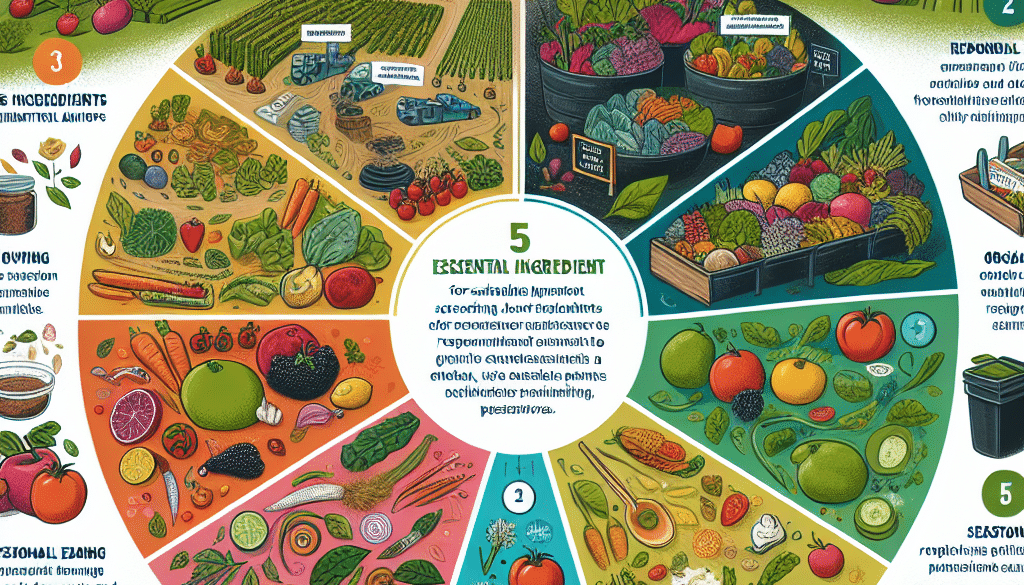Sustainable Ingredient Development: Top 5 Essential Tips
-
Table of Contents
Sustainable Ingredient Development: 5 Essential Tips for Success

The food industry is undergoing a significant transformation, with sustainability at the forefront of innovation. As consumers become more environmentally conscious, the demand for sustainable ingredients has skyrocketed. Developing these ingredients, however, is a complex process that requires careful consideration of environmental impact, resource efficiency, and economic viability. In this article, we will explore the top five essential tips for successful sustainable ingredient development.
1. Prioritize Local and Seasonal Sourcing
One of the cornerstones of sustainable ingredient development is the emphasis on local and seasonal sourcing. This approach not only reduces the carbon footprint associated with transportation but also supports local economies and promotes biodiversity.
- Support Local Agriculture: Partnering with local farmers can ensure a steady supply of fresh, seasonal ingredients while minimizing transportation emissions.
- Seasonal Menus: Designing products that utilize seasonal ingredients can reduce the need for out-of-season produce, which is often imported or grown in energy-intensive greenhouses.
Case studies from companies like Farmdrop in the UK highlight the benefits of a local and seasonal approach, reporting reduced food miles and support for over 450 local producers.
2. Embrace Plant-Based Alternatives
The shift towards plant-based diets is more than a trend; it’s a necessary step towards a more sustainable food system. Developing ingredients that can replace animal-derived products is crucial for reducing greenhouse gas emissions and water usage.
- Innovative Proteins: Exploring sources of plant-based proteins, such as peas, rice, and algae, can offer sustainable alternatives to meat and dairy.
- Functional Benefits: Plant-based ingredients often come with added health benefits, appealing to health-conscious consumers.
Statistics show that plant-based diets could reduce food-related greenhouse gas emissions by up to 70%, making the development of plant-based ingredients a priority for sustainable innovation.
3. Optimize Water and Energy Use
Water scarcity and energy consumption are critical issues in the food industry. Sustainable ingredient development must focus on optimizing the use of these resources to ensure long-term viability.
- Water-Efficient Crops: Choosing crops that require less water, such as millet or sorghum, can significantly reduce the water footprint of ingredients.
- Renewable Energy: Utilizing renewable energy sources in the production process can lower the carbon footprint and reduce energy costs.
Companies like Unilever have set ambitious targets to halve their water usage by 2030, demonstrating the industry’s commitment to resource optimization.
4. Foster Transparency and Traceability
Consumers increasingly demand transparency in the supply chain. Sustainable ingredient development must include traceable sourcing practices that ensure ethical and environmental standards are met.
- Blockchain Technology: Implementing blockchain can provide a transparent record of an ingredient’s journey from farm to table.
- Certifications: Obtaining sustainability certifications, such as Fair Trade or Rainforest Alliance, can validate the ethical sourcing of ingredients.
Brands like Patagonia Provisions have successfully leveraged traceability to build consumer trust and loyalty, showcasing the power of transparency in sustainable development.
5. Reduce Waste Through Upcycling
Food waste is a significant issue, with approximately one-third of all food produced globally going to waste. Upcycling—turning by-products or waste materials into new ingredients—can play a vital role in sustainable development.
- Innovative By-Products: Using by-products from other industries, such as spent grains from brewing, can create new, sustainable ingredients.
- Zero-Waste Processes: Developing processes that utilize the entire raw material can minimize waste and maximize efficiency.
Upcycled ingredients are gaining traction, with companies like ReGrained turning brewery waste into nutritious flour, demonstrating the potential of waste reduction in ingredient development.
Conclusion
Sustainable ingredient development is not just an ethical imperative but also a business opportunity. By prioritizing local and seasonal sourcing, embracing plant-based alternatives, optimizing resource use, fostering transparency, and reducing waste, companies can meet consumer demand for sustainable products and contribute to a healthier planet. These five essential tips provide a roadmap for success in the ever-evolving landscape of food sustainability.
For those looking to incorporate sustainable, high-quality protein into their products, ETprotein offers a range of organic bulk vegan proteins and L-(+)-Ergothioneine (EGT) that align with these sustainable development principles. Their non-GMO, allergen-free proteins, with high purity levels, cater to various industries, ensuring that your products not only meet but exceed sustainability and quality standards.
About ETprotein:
ETprotein, a reputable protein and L-(+)-Ergothioneine (EGT) Chinese factory manufacturer and supplier, is renowned for producing, stocking, exporting, and delivering the highest quality organic bulk vegan proteins and L-(+)-Ergothioneine. They include Organic rice protein, clear rice protein, pea protein, clear pea protein, watermelon seed protein, pumpkin seed protein, sunflower seed protein, mung bean protein, peanut protein, and L-(+)-Ergothioneine EGT Pharmaceutical grade, L-(+)-Ergothioneine EGT food grade, L-(+)-Ergothioneine EGT cosmetic grade, L-(+)-Ergothioneine EGT reference grade and L-(+)-Ergothioneine EGT standard. Their offerings, characterized by a neutral taste, non-GMO, allergen-free attributes, with L-(+)-Ergothioneine purity over 98%, 99%, cater to a diverse range of industries. They serve nutraceutical, pharmaceutical, cosmeceutical, veterinary, as well as food and beverage finished product distributors, traders, and manufacturers across Europe, USA, Canada, Australia, Thailand, Japan, Korea, Brazil, and Chile, among others.
ETprotein specialization includes exporting and delivering tailor-made protein powder and finished nutritional supplements. Their extensive product range covers sectors like Food and Beverage, Sports Nutrition, Weight Management, Dietary Supplements, Health and Wellness Products, and Infant Formula, ensuring comprehensive solutions to meet all your protein needs.
As a trusted company by leading global food and beverage brands and Fortune 500 companies, ETprotein reinforces China’s reputation in the global arena. For more information or to sample their products, please contact them and email sales(at)ETprotein.com today.












